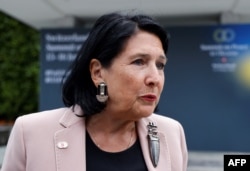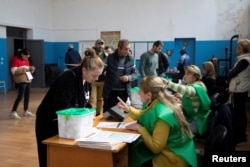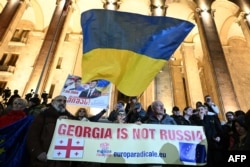Accused of interference in Georgia, Russia pumps up anti-US propaganda
Tbilisi and Moscow have exchanged harsh rhetoric about the results of the October 26 parliamentary elections in Georgia that brought thousands to the streets protesting the victory of the ruling Georgian Dream party.
Georgian President Salome Zourabichvili, who is aligned with the pro-Western opposition, accused Russia of running a “special operation” to “falsify” the election results in favor of the ruling party, which is widely seen as increasingly pro-Kremlin and authoritarian.
In response, Russia denied involvement and framed the United States and European Union as destabilizing powers. In doing so, Moscow’s network of officials and state-owned outlets engaged in disinformation and conspiracy theories, going so far as to allege on a state-controlled news agency that the U.S. and Ukraine were secretly deploying snipers to shoot at protesters in Tbilisi to escalate the situation.
Zourabichvili also told Reuters that Russian “methodology and the support of most probably Russian FSB [Federal Security Service] types is shown in this election.”
“The propaganda that was used ahead of the election … was a direct duplication, a copy-paste, of Russian clips and videos used at the time of [Russian President Vladimir] Putin’s election,” said Zourabichvili, whose position as president is largely ceremonial.
Kremlin spokesman Dmitry Peskov denied Russian interference in the election and accused Zourabichvili of “attempting to destabilize the situation.”
Peskov had earlier alleged it was the European countries that “tried to influence the outcome of this vote.”
Former Russian President Dmitry Medvedev called Zourabichvili a “puppet president” who “refused to accept the election and went against the Constitution by calling for a coup.”
“The standard practice in such cases is removal from office and arrest,” Medvedev wrote on X.
Russian Foreign Ministry spokeswoman Maria Zakharova accused the U.S. of engaging in “neo-colonialism” after U.S. State Department spokesman Matthew Miller warned the Georgian government could face “consequences” if it did not “walk back its anti-democratic actions and return to its Euro-Atlantic path.”
Russian state media went further, spreading a conspiracy theory that the West was seeking to foment violence in Georgia.
“In their attempts to knock off balance the internal political situation in Georgia following the October 26 election and set off another color revolution, Westerners stop at nothing,” the Russian state-owned Sputnik news agency said, quoting unnamed “sources in the region.”
“Ukraine-trained snipers are arriving in the republic to organize provocations during mass protests,” Russia’s state-owned Tass news agency reported Monday, citing a “regional official familiar with the matter.”
The term “color revolution” was widely adopted after the 2004-05 Orange Revolution in Ukraine was sparked by a corruption-ridden presidential runoff that saw the pro-Russian candidate, Viktor Yanukovych, emerge victorious.
Russia typically uses the term when accusing the West of orchestrating movements to destabilize or overthrow Kremlin-preferred governments.
In the months leading up to Georgia’s parliamentary poll, Russian state media ran reports alleging the U.S. was seeking to foment a color revolution or “a Ukraine-style coup.”
In July, Russia’s state-run Sputnik news agency cited an anonymous Russian intelligence official who claimed U.S. authorities were planning a “sacred sacrifice” from among the protest participants.
The disinformation narrative in Sputnik’s report reflects a well-worn Kremlin conspiracy theory going back to the 2013-14 pro-Europe rallies in Ukraine, when the Russians claimed that American-trained Georgian “mercenaries” were responsible for shooting protesters in Kyiv during the 2014 demonstrations at the city’s Maidan Nezalezhnosti, widely known as the Maidan or Independence Square.
Russian state media and top officials, including Putin, falsely claimed that the U.S. organized protests in Ukraine to propagate a coup.
That narrative included a conspiracy theory that Victoria Nuland, an American diplomat and former assistant secretary of state for European and Eurasian affairs, had ordered “American specialists” to lead the “snipers, who shot people at the Maidan.”
Amid ongoing protests in Georgia, the U.S. and the EU have joined calls from international and local observers to investigate alleged election-related violations.
On Thursday, Georgian authorities launched an investigation into election-fraud allegations.
The EU and U.S. have repeatedly warned Georgia about what they call its “democratic backsliding,” even freezing financial support to the country’s government, focusing instead on supporting civil society initiatives.
In June, Georgian Dream officials signed into law a bill that required nongovernmental agencies receiving at least 20% of their funding from abroad to label themselves as foreign agents “pursuing the interests of a foreign power.”
In response, Brussels paused Georgia’s accession process to the EU, saying the foreign agent law is incompatible with EU membership.
Georgia’s opposition has nicknamed Tbilisi’s new foreign agent law the “Russian law,” a reference to similar legislation enacted in Russia in 2012 that has been used to silence civil society and independent media.
The EU also warned it may freeze visa-free travel with Georgia if it finds the parliamentary poll neither free nor fair.





